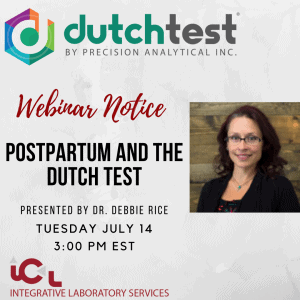Postpartum and the DUTCH Test

6th July 2020
Symptoms of the baby blues can range from sadness and mood swings to irritability, sleep changes, and excessive worry or lack of interest in day to day life including her baby. For many women, these symptoms will not last longer than a few days, with the majority feeling better within a week or two of becoming a new mother. For others, the situation may be more severe, and the symptoms can last much longer.
What causes the baby blues?
No one knows for sure. Hormonal changes in a woman’s body may trigger its symptoms. During pregnancy, estrogen and progesterone increase significantly. In the first 24 hours after childbirth, the amount of these hormones drops rapidly and keeps dropping to the level they were before pregnancy. Researches think these changes in hormones may lead to depression, just as smaller changes in hormones can affect a woman’s mood before she gets her period.
Hormone Imbalances
Estrogen and progesterone are both produced in the ovaries (corpus luteum), and placenta during pregnancy. Progesterone levels rise significantly in the beginning of pregnancy. Progesterone prepares the endometrium and its vessels to ‘feed’ the growing fetus, it also prohibits uterine muscle contractions and prevents preterm childbirth. Estrogen levels increase during pregnancy and are highest before labor.
Estrogen dominance and adrenal dysfunction are important to consider. Studies have examined cortisol in new mothers and found that women with higher levels of cortisol postpartum are more attracted to their babies’ scents, and more attentive to them. These behaviors, in turn, have been associated with a stronger mother-infant bond. If adrenal dysfunction is present, these bonding behaviors may suffer. Additionally, estrogen dominance and adrenal dysfunction may be interlinked and have many of the same symptoms: fatigue, weight gain and irritability.
This complimentary webinar will cover the following:
- What is postpartum? How do we define postpartum and what does this mean? Review of pregnancy and hormone changes throughout pregnancy that lead to labor and delivery as this starts the cascade of hormone changes for the next stage: Postpartum.
- Review of specific hormones that influence postpartum: Estrogen and Progesterone are major hormones in this, but they are not alone in influencing how the body readjusts and stabilizes after birth.
- Options for evaluation of hormones at play in postpartum: trustworthy and reliable testing that offers insight for you and your provider to direct you appropriately in feeling optimal.
- What can we do to support women struggling with postpartum: treatment strategies to achieve optimal postpartum health.
Meet the presenter
Debbie Rice, ND, MPH is a naturopathic doctor who maintains a part-time practice where she focuses care on pediatric health, hormone health, thyroid health, and adrenal health. She has had experience working with communities in need, both in the United States and internationally. Her training has been primarily in women’s health, pediatric care, hormone therapy and hormone function, as well as complimentary adjunct care. Dr. Rice utilizes multiple modalities including diet and lifestyle, botanical medicine, and conventional approaches that meet the patient where they are at in their health journey. Dr. Rice is the Assistant Medical Director for Precision Analytical Inc., creators of the DUTCH Test. Dr. Rice’s passions include activism for access to health care, yoga, and exploring nature.
